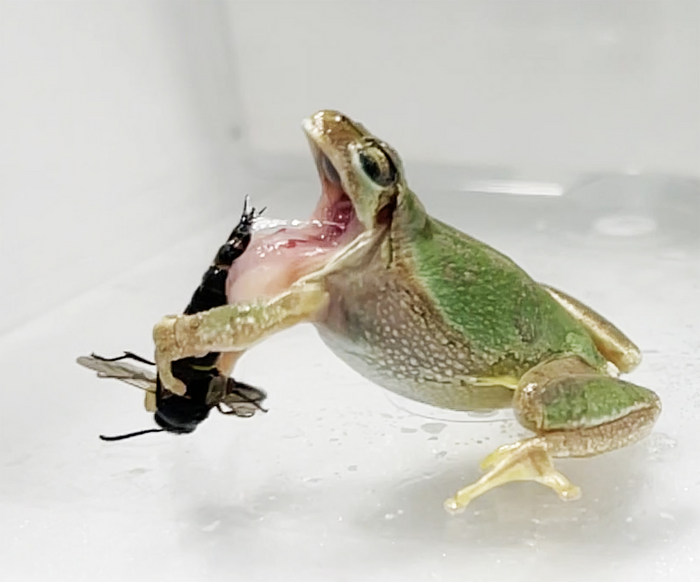Female bees and wasps use modified ovipositors, formerly used in egg laying, to sting their attackers, including people. Now, a study in Current Biology on December 19 shows that male mason wasps use sharp genital spines to attack and sting predatory tree frogs to avoid being swallowed.

Credit: Current Biology/Sugiura et al.
Female bees and wasps use modified ovipositors, formerly used in egg laying, to sting their attackers, including people. Now, a study in Current Biology on December 19 shows that male mason wasps use sharp genital spines to attack and sting predatory tree frogs to avoid being swallowed.
“The genitalia of male animals have frequently been studied in terms of conspecific interactions between males and females but rarely in terms of prey-predator interactions,” said Shinji Sugiura, Kobe University, Japan. “This study highlights the significance of male genitalia as an anti-predator defense and opens a new perspective for understanding the ecological role of male genitalia in animals.”
Suguira and study co-author Misaki Tsujii made the discovery after an accident. Tsujii was studying the life history of the mason wasp, Anterhynchium gibbifrons, when she got stung.
“Surprisingly, the male ‘sting’ caused a pricking pain,” Sugiura said. “Based on her experience and observations, I hypothesized that the male genitalia of A. gibbifrons function as an anti-predator defense.”
Wasps and bees are, of course, well known to use venomous stings to defend themselves and their colonies against attackers. But, because they have evolved venomous stings from ovipositors, males lacking ovipositors were believed harmless. Feeling the pain of a male sting didn’t add up.
To study further, the researchers placed male wasps with a potential tree frog predator. All of the frogs attacked the male wasps, but just over a third spit them back out. The researchers witnessed the wasps stinging the frogs with their genitalia while being attacked.
When they gave tree frogs wasps that were no longer endowed with genitalia? They ate them right up.
The findings show that the male wasps use their genitalia to sting predators and avoid being eaten. Because male genital spines (called “pseudo-stings”) are found in some wasp families, they say that the newly discovered defensive role will likely be found in many wasp species.
###
This work was supported by a Grant-in-Aid for Scientific Research (JSPS KAKENHI: 19K06073).
Current Biology, Sugiura et al.: “Wasp male genitalia as an anti-predator defense” https://www.cell.com/current-biology/fulltext/S0960-9822(22)01820-6
Current Biology (@CurrentBiology), published by Cell Press, is a bimonthly journal that features papers across all areas of biology. Current Biology strives to foster communication across fields of biology, both by publishing important findings of general interest and through highly accessible front matter for non-specialists. Visit http://www.cell.com/current-biology. To receive Cell Press media alerts, contact [email protected].
Journal
Current Biology
DOI
10.1016/j.cub.2022.11.030
Method of Research
Experimental study
Subject of Research
Animals
Article Title
Wasp male genitalia as an anti-predator defense
Article Publication Date
19-Dec-2022




